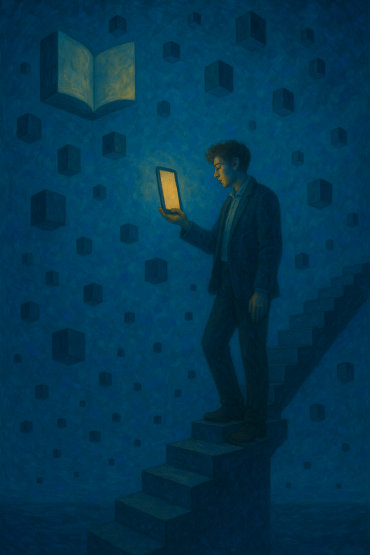Everyday Life Transformed by Minimalism and Technology: Finding the Essence of Life in Simplicity
The Counterattack of the Small: Thinking in an Era Where Technology and Philosophy Meet
Once, humanity held awe for the colossal. Ambitions for skyscrapers, massive machines racing across the fields, and transnational organizations seeking to control the world. Size was synonymous with power, and moving larger, higher, and faster symbolized progress. However, times have changed. Now, it is the small devices in our pockets that drive the world. Those things that were once unnoticed are quietly taking hold of the deepest realms of life. We now stand before a new question: 'What does it truly mean to be small?'
The Philosophy of Smallness, the Abyss of Minimalism
Minimalism is not about deficiency, but rather the aesthetics of choice. Simplicity is not a sign of poverty but the result of a refined intelligence that distills essence. 'Reduction' is not merely about elimination it is a continuous question and response about the core of life. What constitutes me? What is absolutely necessary? As the number of objects decreases, space expands. As space empties, the mind fills. When a refined device or a simply designed item is held, it becomes more than just functional it is a 'physical declaration of self-identity.' Small and sleek technology is no longer just a tool. It is a new language that silently represents my choices, my standards, and my attitude. 'The less, the more abundant.' This contradictory phrase has now become a philosophy and a strategy for life.
The Aesthetics of Choice, Harmonizing the Meaning of Life
Minimalism is not a life that eliminates everything. Rather, it is a continuous series of intense choices. What to discard and what to keep. That seemingly simple decision accumulates and shapes me, and molds my life. Even the act of choosing a device is not a mere purchase. The brand I choose and the design I carry — all of these ultimately express 'who I am' to the outside world. Within a single object, my beliefs, tastes, and philosophy of life are infused. Such small and trivial choices adjust the rhythm and depth of my entire life. This is the question that minimalism poses to life: 'What do you choose to keep in your life?'
Intersection of Small Technology and Self
Small things are not always quiet. Rather, the smallest things often tell the biggest stories. The device held in our hand, the world contained within it, is now an extension of our exterior and interior. The way we use that device, the reasons we choose it, the taste reflected in its design—all of these implicitly reveal the coordinates of our existence. Now, small devices no longer linger around our lives. They move to the center and connect with our selves. That one device we hold unconsciously is what determines my daily life, my identity, the flow of my time. And we gradually realize that smallness is, in fact, a form that poses the deepest questions from the closest places.
Questions Arising at the Intersection of Inner Self and Technology
However, we cannot stop here. We must ask ourselves, 'Are all these choices truly mine?' As the number of small technologies increases, our choices become more subtle, and expectations grow. We strive to convey more meaning in smaller screens and share more complex emotions with simpler devices. Yet, in this process, fatigue, dependency, and confusion about identity also grow. We have come to believe that we have gained freedom through technology, but that freedom often returns as the paradox of anxiety about the 'device-free me.' Now that small devices have become central to our lives, we must once again ask ourselves, 'What do I truly want?' 'Is this choice a genuine decision that arises from within, or is it merely a reflex conditioned by familiarity?'
Branding of Life and the Test of Authenticity
Today, minimalism has unexpectedly become a 'style' and 'marketing language.' White walls, clean lines, restrained lighting. It is a neat aesthetic and a self-presentation for display. However, minimalism that merely imitates the exterior is nothing more than an empty shell. True simplicity does not exist to be displayed. It exists to establish an invisible center. The essence of 'emptiness' is a return to essence, not packaging. Ultimately, for a lifestyle to become truth, efforts to reflect on the center of the heart must come before refining the outward appearance.
Freedom and Dependence Given by Small Things
Small technologies grant us unprecedented freedom. They allow us to work, connect, and relax anywhere. We can write, share emotions, and find inspiration even while on the move. However, that freedom always comes with the shadow of 'dependence.' Without it, we become anxious, constantly seek validation, and can’t endure our own silence. While the hand holding the small device may free me, when that hand cannot let go, freedom devolves into a prison. True freedom does not come from liberation from technology but rather from a healthy distance with it. The effort to maintain balance while being aware of both possibilities and risks — on that delicate boundary, our lives become more refined and profound.
Conclusion: An Era Led by Smallness
We are no longer moved by 'grandeur.' Instead, we assign more significance to the small and quiet things that reflect us most closely. Being small has become a mirror that reflects not just the 'smallness' itself, but the choices we make, the lives we build, and the directions we take. The philosophy of smallness is ultimately a philosophy of self-understanding. Within that smallness, we revisit essence, gauge truth, and fine-tune ourselves. Therefore, these questions remain pertinent: 'What will I leave behind, and what will I shed?' 'Does that smallness set me free, or does it confine me?' Your answers to these questions will define your life.

Post a Comment